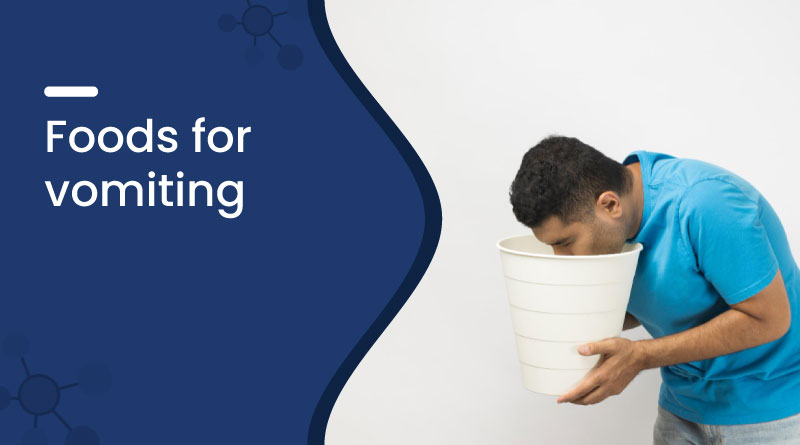Best Foods to Eat When Vomiting | Quick Relief from Nausea


Vomiting, the forceful expulsion of stomach contents through the mouth, is quite an uncomfortable and exhausting condition, especially when it happens frequently. No matter if it is due to a stomach flu, motion sickness, or food poisoning, eating the right foods can help you feel better faster. In this blog, we’ll discuss what to eat when nauseous and vomiting, what to avoid, and much more.
Common Causes of Vomiting
Vomiting is not a disease but a symptom. It is our body’s way of getting rid of something harmful or responding to irritation in the digestive system. Understanding the cause of any problem can help in choosing the right methods for its treatment and taking an appropriate dietary plan. Common causes include:
- Food poisoning
- Stomach infections (viral or bacterial)
- Motion sickness or travel-related nausea
- Morning sickness during pregnancy
- Migraine
- Overeating or indigestion
- Side effects of medications
- High fever or dehydration
What to Eat During Vomiting?
Although nausea can make eating difficult, consuming the right foods and fluids is essential to stay hydrated, restore electrolytes, and soothe your stomach. Here are some foods you can opt for:
- Clear Liquids: Sip on water, coconut water, ORS, or clear broths. These help replace lost fluids and prevent dehydration.
- Ginger: Ginger, whether fresh or as tea, is effective in calming stomach discomfort and reducing nausea. It's especially helpful in travel or pregnancy-related vomiting.
- Bananas: Bananas are soft, gentle on the stomach, and rich in potassium — an important mineral lost during vomiting.
- Boiled Rice or Rice Water: Plain rice or rice water (kanji) is easy to digest and can settle the stomach.
- Toast or Khichdi: Dry toast or light khichdi (made without spices) can provide some nutrition without irritating the stomach lining.
- Applesauce: Cooked apple (or applesauce) is soothing, fibrous, and a good source of natural sugars for energy.
- Citrus Fruits: Can help with nausea, but may be best avoided if they cause further irritation.
Indian Home Remedies for Vomiting Relief
- Ginger: It has anti-inflammatory properties and can be consumed in various ways. You can directly chew a small piece of ginger or make ginger tea or ginger ale.
- Lemon: The acidic nature of lemon can help to soothe the stomach. Try drinking lemon juice blended with warm water, or simply lick a lemon sprinkled with a pinch of black salt.
- Jeera (Cumin) Water: Jeera can help reduce the feeling of nausea and bloating. You can boil cumin seeds in water, let it cool down, and then sip slowly.
- Black Salt: Putting black salt just under the tongue can help reduce nausea.
- Peppermint: It can loosen up the stomach muscles, which reduces nausea and vomiting. You can make peppermint tea by using either its fresh or dried leaves.
Additional Tips to Manage Frequent Vomiting
Frequent vomiting can lead to weakness in the body. To avoid that and also speed up recovery, you can follow these tips:
- Stay hydrated: Small, frequent sips of fluids
- Eat small meals: Avoid heavy or large portions
- Rest: Let your body recover
- Avoid strong smells: They can trigger nausea
- Maintain good hygiene: Especially with food and water
When To See A Doctor?
Vomiting usually subsides in a day or two, but medical attention is necessary if you experience:
- Blood in vomit
- Continuous vomiting for over 24 hours
- Signs of dehydration (dry mouth, no urination, fatigue)
- Severe abdominal pain or fever
- Vomiting during pregnancy that affects nutrition
- Vomiting after a head injury
Also read: Vomiting Medicine Names With Price in India
Vomiting in Kids (Guide for Parents)
Vomiting is a very common thing in children and is usually caused by viral infections, food intolerance, motion sickness, or overeating. While it often goes away on its own, it can still be stressful for parents.
| What To Do | What To Avoid |
|---|---|
| Keep your child hydrated by giving small amounts of fluids every few minutes | Force children to eat or drink immediately after vomiting |
| Feed light foods that are easy to digest | Fizzy drinks, sweets, or spicy foods |
| Keep the child at rest and calm | Avoid screen time or any physical activity |
| Feed water, coconut water, ORS | Do not give milk |
Conclusion
Vomiting can be due to infection, motion sickness, or food issues. Start with sips of water and light foods like banana, rice, or toast. Skip oily or spicy meals. Home remedies like ginger or jeera water can help. But if it doesn’t stop or gets worse over time, especially in kids, do not delay seeking medical attention.
Frequently Asked Questions (FAQs)
Q. What should I eat after vomiting?
A. Start with bland foods like bananas, rice, toast, or boiled potatoes. Sip on clear fluids to stay hydrated.
Q. Is it okay to drink water after vomiting?
A. Yes, but take small sips. Drinking too much water immediately after you have just vomited may trigger more vomiting.
Q. What drinks help stop vomiting?
A. Ginger tea, lemon water, and clear broths are gentle on the stomach and may ease nausea.
Q. Is vomiting during pregnancy normal?
A. Yes, especially during the first trimester (morning sickness). However, frequent or severe vomiting should be reported to a doctor.
Recent Blogs
Disclaimer : Zeelab Pharmacy provides health information for knowledge only. Do not self-medicate. Always consult a qualified doctor before starting, stopping, or changing any medicine or treatment.
















 Added!
Added!